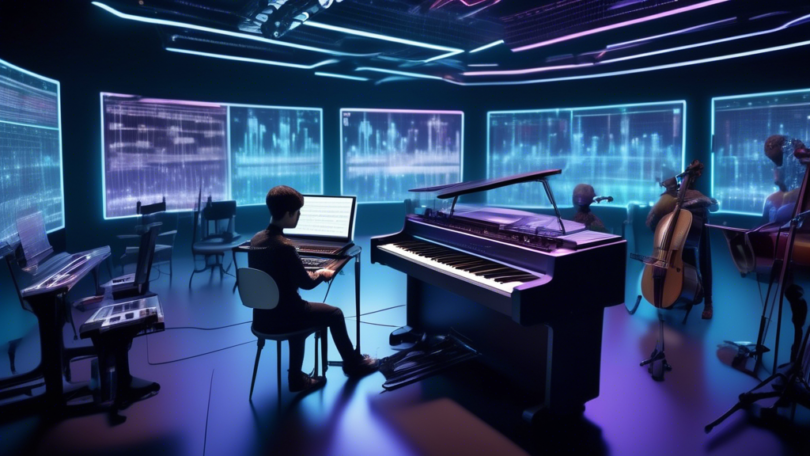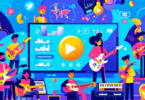Artificial intelligence (AI) has been silently revolutionizing numerous industries over the past few decades, and the music industry is no exception. The integration of AI into music began as an experimental venture, with early efforts focusing on automating simple tasks. However, as technology evolved, AI’s role in music grew exponentially, impacting various facets from music creation to licensing. The importance of AI-driven innovations in modern music production cannot be overstated. These technological advancements have unlocked new potential for artists and producers, enabling them to explore novel creative avenues and streamline cumbersome processes.
This article delves into the transformative journey AI has embarked upon within the music industry, with a particular focus on music creation and licensing. It will explore how AI tools are reshaping the way music is composed and produced, highlighting examples of cutting-edge software and applications that empower creators. Benefits such as increased production speed, enhanced creativity, and boundless experimentation will be discussed, alongside real-world case studies involving prominent musicians and producers who have successfully integrated AI into their work.
Moreover, the article will address the burgeoning field of AI-generated music, examining both its potential and limitations. Concerns regarding the quality and originality of AI-composed pieces will be considered, as well as the indispensable role of human creativity in the process. Beyond creation, the focus will shift to the realm of music licensing, where AI is making significant strides toward improving efficiency and accuracy. Traditional licensing models often present numerous challenges for artists and licensors, but AI-driven solutions are poised to alleviate these issues.
By streamlining rights management and royalty distribution, AI is not only simplifying the administrative burdens but also ensuring fairer and more transparent practices. However, the rise of AI in music licensing also brings forth legal and ethical considerations. Questions about copyright, ownership, and the balance between AI-generated content and human rights will be thoughtfully explored. As we look to the future, this article will offer predictions and insights into the evolving landscape of music licensing with the continued integration of AI, envisioning a harmonious collaboration between technology and human artistry.
AI in Music
Brief history of AI integration in the music industry
Artificial Intelligence (AI) has gradually woven itself into the fabric of numerous industries, and the music sector is no exception. The journey began in the mid-20th century, with early computer-generated compositions like the 1956 recording of the Illiac Suite for String Quartet, created by Lejaren Hiller using the ILLIAC I computer at the University of Illinois. Over the decades, technological advancements have propelled AI’s capabilities from rudimentary sound synthesis to sophisticated music composition and production solutions. By the 1990s, AI music applications were more practical and commercially viable, demonstrated by David Cope’s Experiments in Musical Intelligence (EMI), capable of emulating the styles of famous composers. Today, AI’s role in the music industry spans a broad spectrum, deeply influencing how music is created, produced, and consumed.
Importance of AI-driven innovations in modern music production
The integration of AI into modern music production cannot be overstated. AI-powered technologies bring several transformative benefits to the table, reshaping traditional workflows and enabling unprecedented levels of creativity. For instance, AI can analyze vast datasets to identify patterns and trends, helping artists and producers understand what resonates with audiences. This insight enables the creation of more impactful music.
Moreover, AI-driven tools can automate labor-intensive tasks such as audio editing, mixing, and mastering, significantly speeding up production timelines and allowing artists to focus more on the creative aspects of their work. These technologies are also democratizing music production, making sophisticated tools accessible to independent musicians who may not have the resources to afford high-end studio equipment or professional engineering talent.
Overview of the article’s focus: Music creation and licensing
This article delves into the profound impact AI is having on music creation and licensing. AI is revitalizing the music creation landscape—transforming how compositions are crafted, how production processes are streamlined, and how creative potential is unlocked. On the licensing front, AI is revolutionizing traditional models by improving efficiency in rights management and royalty distribution, tackling longstanding issues like copyright infringement and fair compensation.
In examining AI’s role in music creation, we will explore various AI-powered tools and applications that are reshaping the industry. We will highlight real-world examples and case studies that demonstrate the practical uses and successes of these technologies. Additionally, we will address the burgeoning field of AI-generated music, weighing its potential against quality concerns and discussing how human creativity remains an indispensable element.
Similarly, in the domain of music licensing, we will detail how AI is overcoming traditional challenges and enhancing operational efficiencies. This segment will also cover the ethical and legal implications of these advancements, focusing on the balance between AI innovation and the preservation of human rights. Through this exploration, we aim to provide a comprehensive understanding of AI’s transformative power in the music industry and offer a glimpse into the future of music creation and licensing.
The subsequent sections will delve deeper into these topics, providing detailed insights and examples to illustrate the ongoing AI revolution in music. Stay tuned as we uncover how these cutting-edge technologies are redefining the boundaries of what is possible in the realm of music.
Revolutionizing Music Creation with AI
The integration of artificial intelligence (AI) in the music industry is not just a futuristic concept but an active reality that is continually reshaping how music is created, composed, and produced. AI tools are providing artists and producers with innovative solutions that enhance creativity and streamline the music-making process. Let’s delve into how these AI advancements are making waves in the music creation space.
How AI Tools Are Shaping Music Composition and Production
AI-powered music software and apps are introducing unprecedented capabilities in music composition and production. These tools analyze vast amounts of data, learning from existing music to create new compositions, suggest harmonies, generate beats, or even master tracks. Here are a few notable examples:
- Amper Music: This AI platform enables users to create music tracks in minutes. By selecting a genre, mood, and other parameters, composers can generate music that matches their vision, making the process efficient and highly customizable.
- AIVA (Artificial Intelligence Virtual Artist): AIVA composes music by understanding music theory and genres. It has been used for applications ranging from soundtracks for advertisements and video games to orchestral compositions.
- OpenAI’s MuseNet: MuseNet can generate four-minute compositions with 10 different instruments, and it understands various styles from Mozart to contemporary pop, allowing for diverse music creation.
These AI tools offer numerous benefits, enhancing the creative process in several significant ways:
- Speed: AI accelerates the pace of music production. What might take hours or days for a human composer can be achieved in a matter of minutes or seconds with AI, allowing artists to produce and release work more quickly.
- Creativity: AI amplifies creativity by offering suggestions and ideas that a human might not consider. It can generate novel combinations of sounds and melodies, pushing the boundaries of traditional music composition.
- Experimentation: AI tools enable artists to experiment boldly with their compositions. They can easily test different variations and styles, exploring multiple creative paths without the time and labor constraints of manual adjustments.
Case Studies of Prominent Musicians and Producers Using AI
Several high-profile musicians and producers are adopting AI to complement their creative processes, yielding remarkable outcomes. Here are a few notable case studies:
- Taryn Southern: Singer-songwriter Taryn Southern used AI tools like Amper Music and AIVA to produce her album I AM AI, making history as one of the first full-length albums co-produced with AI. The collaboration allowed her to explore uncharted musical territories and streamline her production workflow.
- Grimes: The Canadian artist and producer has incorporated AI in her music creation, particularly in her single We Appreciate Power. She utilized AI-generated music to augment her avant-garde style, delivering a unique and futuristic sound.
- Björk: Icelandic singer-songwriter Björk partnered with AI company Microsoft on the Kórsafn project, using AI to create choral arrangements that evolve based on real-time environmental data, such as changes in weather and daylight.
These success stories highlight how AI is being embraced by avant-garde and mainstream artists alike, proving its utility in pushing musical boundaries and redefining creative expression.
AI-Generated Music: Potential and Limitations
While AI-generated music presents significant promise, it also comes with its own set of potentials and limitations. One of the salient potentials is the ability of AI to generate an extensive range of music that may be indistinguishable from human-composed pieces. However, concerns about quality and originality often arise:
- Quality Concerns: Not all AI-generated music meets high standards of quality. In some instances, the music might feel repetitive or lack the emotional depth that comes from human nuance. Ongoing advancements in AI aim to address these shortcomings, but the human ear can still often detect the subtle differences.
- Originality Concerns: AI operates by learning from existing music, which raises concerns about originality. Critics argue that AI compositions might inadvertently replicate existing works, leading to questions about creativity and inspiration. Ensuring compositions are sufficiently distinct remains a challenge.
Despite these limitations, AI’s role in music creation is not to replace human musicians but to enhance their capabilities. The synergy between human creativity and AI technology can result in groundbreaking music that neither could achieve independently. Musicians can leverage AI for inspiration, collaboration, and technical excellence, while human ingenuity remains the cornerstone of emotional depth and artistic vision in music.
As AI continues to evolve, its integration in music creation promises to unlock new potentials, inviting artists to explore uncharted musical landscapes and redefine the very essence of musical creativity.
Transforming Music Licensing Through AI
Traditional music licensing models have long been plagued by inefficiencies, bringing about significant challenges for both artists and licensors. The conventional process involves a labyrinth of rights and permissions, often requiring extensive manual intervention. Determining who owns the rights to a song, managing royalty distributions, and ensuring everyone gets paid accurately and on time can be cumbersome and fraught with errors. The result is delayed payments to artists, disputed claims over rights ownership, and administrative headaches for all parties involved.
The advent of AI is poised to revolutionize this complex landscape, bringing with it a new era of efficiency and accuracy in music licensing. AI’s ability to automate complicated tasks and analyze vast amounts of data quickly is transforming how rights are managed and royalties are distributed.
AI’s Impact on Music Licensing Efficiency and Accuracy
AI’s role in streamlining rights management is perhaps one of the most significant advancements in music licensing. By employing machine learning algorithms and natural language processing, AI systems can swiftly scan through contracts and legal documents, accurately identifying ownership details and rights information. This automation significantly reduces the time and labor spent on these tasks, freeing up resources for more creative endeavors.
When it comes to royalty distribution, AI’s data processing capabilities are unmatched. It can track music usage across multiple platforms, ensuring that every stream or download is accounted for. Real-time data analysis means artists and rights holders receive more timely and accurate payments, minimizing disputes and enhancing trust in the licensing system. Examples include blockchain technologies integrated with AI to provide transparent and immutable records of rights and transactions.
Legal and Ethical Considerations in AI-Driven Music Licensing
While AI offers substantial improvements, it also brings forward several legal and ethical dilemmas. One primary concern is copyright issues. As AI systems create and manage music, determining the ownership of AI-generated content can be complex. Who owns the rights to a piece of music entirely generated by an algorithm? Do the creators of the AI software hold partial rights, or is it the user who employed the tool to produce the music?
Additionally, there’s the challenge of maintaining a balance between AI-driven processes and human rights. Ensuring that musicians and creators retain control over their work is crucial. Companies and legal frameworks must adapt to address the nuances of AI involvement in music production and licensing. Ethical considerations also extend to the fair treatment of artists, preventing exploitation by automated systems designed to maximize profit at the expense of creative control and fair compensation.
Future Prospects: Predicting the Next Steps in Music Licensing Evolution with AI
The future of music licensing appears to be deeply entwined with AI innovations. We can anticipate more sophisticated AI systems capable of handling even more complex licensing scenarios with greater precision. Blockchain technology, combined with AI, will likely become a standard practice, offering decentralized and transparent management of music rights and royalties. This could simplify international licensing, ensuring artists worldwide receive their due without the current geographical and administrative barriers.
Moreover, we may see the rise of AI as a mediator in disputes over rights and royalties. Advanced AI algorithms could provide impartial assessments based on detailed analysis of usage data and contractual agreements, potentially reducing the number of litigations and fostering a more harmonious industry environment.
In the creative facets, there might be a collaborative ecosystem where human creativity and AI capabilities complement each other seamlessly. Artists could license AI-generated sections or enhancements for their tracks, tailoring the AI output to fit their unique style, thereby creating a blend of human artistry and machine precision that pushes the boundaries of what’s possible in music.
As these technologies continue to evolve, the ongoing dialogue between technologists, legal experts, and creatives will be fundamental. Developing frameworks that support innovation while protecting the rights and livelihoods of artists will be key to leveraging AI’s full potential in transforming music licensing.
The integration of artificial intelligence into the music industry marks a significant transformation in both music creation and licensing. This technological advancement has not only accelerated the speed of production but also expanded the boundaries of creativity and experimentation for artists and producers. AI-driven tools and software have empowered musicians to explore new horizons in music composition, presenting opportunities for innovative collaboration and unprecedented artistic endeavors. Case studies of notable musicians utilizing AI highlight the profound impact of these technologies, underscoring the synergy between human creativity and machine intelligence. Despite the promising potential of AI-generated music, concerns about quality and originality persist, necessitating a balanced coexistence between human artistry and artificial capabilities.
On the licensing front, AI is revolutionizing traditional models by enhancing efficiency and accuracy in rights management and royalty distribution. The traditional challenges of music licensing, such as manual tracking and processing, are being mitigated by AI’s ability to streamline these processes. This shift not only benefits artists by ensuring timely and fair compensations but also enhances transparency within the industry. However, the rise of AI in music licensing introduces new legal and ethical dilemmas, particularly around copyright issues and the delineation of rights between AI and human creators. Addressing these concerns requires a nuanced approach, balancing the transformative potential of AI with the protection of human intellectual property.
Looking ahead, the future of music creation and licensing seems poised for further evolution. As AI continues to develop, we can anticipate even more sophisticated tools and systems that enhance the creative and administrative aspects of the music industry. These advancements promise to foster a more dynamic and equitable musical landscape, where technology serves as a powerful ally in the artistic expression and economic viability of music. The AI uprising in music is not just a fleeting trend but a significant stride towards redefining how music is created, shared, and monetized, heralding a new era of possibilities for the industry at large.








